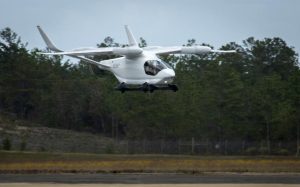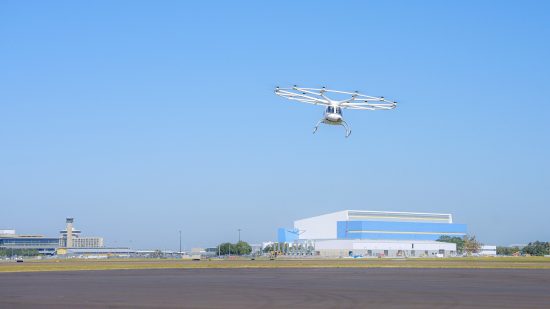
The Alia all-electric airplane comes in for a landing at Eglin Air Force Base on October 26, 2023. Courtesy: Samuel King Jr./U.S. Air Force
Tampa seems to be on the cutting edge of new flight technologies, welcoming the Alia, the US military’s first all-electric airplane this past week. As the world’s largest institutional producer of greenhouse gases, the US Air Force has confirmed its plan to reduce the carbon footprint of the US military by using electric planes to transport personnel and cargo to and from important locations. This starts with the Alia, which was transported to Eglin Air Force Base after months of experiments and will begin testing tomorrow (November 7). Both the Alia airplane and the newly-built factory to produce them are said to be zero-emissions, which should drastically change the emission output of the US military.

The Volocopter test flight in Tampa on November 2, 2023. Courtesy, Volocoptor
Also in Tampa airspace this week was the first ever test of an electric vertical take-off and landing (eVTOL) aircraft in the state of Florida, offering a promising new mode of transportation on the horizon – an air taxi known as the Volocopter. This new type of electric vehicle offers the advantage of not needing runway space to take flight, effectively making short and medium range flights possible for the first time. This two-passenger plane meets the same safety guidelines as commercial aircraft and could be expanding to hold up to 4 or 5 passengers in the near future. Volocopter CEO Dirk Hoke is hopeful to have flights online in 2025 or 2026, but there is much infrastructure to be built to accommodate these new vehicles like vertiports (effectively helipads) that would be on tops of buildings for landing and charging zones. The company drafted a 20-year plan including development of vertiports, potential locations, and even partnerships with airlines to offer passengers flights within the city.
While he didn’t initially consider Florida for the new Volocopter test, Hoke was approached by Tampa International Airport CEO Joe Lopano about conducting the test at the Tampa International Airport controlled Sheltair aircraft hangar in downtown Tampa. Currently the company waits to hear the verdict on their certification application to the Federal Aviation Authority but expects to receive a final certification from the European Union Aviation Safety Management next year and start flying in France and Italy shortly after. As St. Petersburg Mayor Ken Welch said, “Economic mobility depends on transportation (and) transportation mobility is one of the last great challenges to (Tampa’s) emergence as an economic super region.” Hopefully with the right charge, these e-vehicles can offer multimodal transportation infrastructure across the world – and across Florida – within the next several years.
See you on the trail,
Lisa

